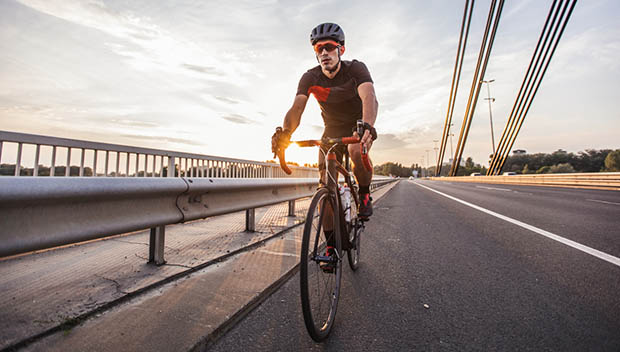
Carrying less total weight can absolutely affect your cycling performance, which is why many cyclists aim to have the lightest bikes and the best riders have very lean bodies. Some gear junkies go as far as weighing each gram of equipment to get their setup as light as possible. Products from bikes to sunglasses typically list their weight in grams to show which items are the lightest. 'Weight Weenies,' as they are known in the cycling community, are willing to pay extra for these lightweight items. Investing in light gear is an easy (although expensive) way to buy speed, but there is another option: your body!
Type of Effort
The type of riding you do can influence whether or not you need to focus on weight loss for performance. Flat roads and sprint finishes do not see a significant improvement from a change in weight status. However, in situations like long hill climbs and sprinting out of corners, being lighter reduces the energy output needed when comparing a heavier cyclist to a lighter one. Using data analysis, such as Best Bike Split, can show you exactly how much your times can improve on a particular ride at various weights.
Power to Weight
This is known as the power to weight ratio; a marker of cycling performance. In this ratio, when weight decreases and power increases or even stays the same, your performance on the bike is better because you are essentially doing less work to have the same outcome. To find your ratio, simply divide your power by weight in kilograms. For example, a 50kg cyclist who can hold 300 watts has a power to weight ratio of 6 while an 80kg cyclist holding 300 watts only has a power to weight ratio of 3.8. That 80kg rider has to put out 300 watts to keep up with the 50kg rider doing only 190. While losing weight is a great way to improve this ratio, improving power is also critical. Cyclists who drop too much weight or lose weight without maintaining fitness will see their power drop, which is not beneficial.
Muscle vs. Mass
An important note is that power to weight is based on total body mass. Whether you have a super a lean body or extra fat isn't part of this equation. This is because that weight is still weight you have to use energy to haul around. Having more muscle mass might make you a better sprinter or stronger overall, but it will still work against you in weight-based situations like the ones mentioned above. Of course muscle burns more calories, making it easier to maintain a leaner body. Having more muscle on your frame can also help improve power outputs and reduce risk of injury. The more excess weight you are currently carrying, the more you should focus on total body mass or BMI. Once a healthy weight is obtained, more gains will come by looking at body fat measurements and working toward a toned, lean and strong body.
Health Status
The more weight you have to lose, the more significant impact weight loss can make on your performance due to health gains associated with obtaining a healthy BMI, such as decreased shortness of breath, less pressure on joints, improved glucose metabolism and more. Getting to a healthy weight for your height should be step one. For cyclists already in great form, losing more weight will continue to have performance benefits as hauling even a pound less makes the effort easier.
Of course, many cyclists can take weight loss too far. Reaching a BMI that is too low can increase risk of injury, delay recovery, reduce power output, increase fatigue, increase risk of nutrient deficiency and disrupt female athletes' hormones. Being ultralight might make you faster, but if you're injured, tired and malnourished, you won't be a better athlete in the long run.
Reducing weight from your bike and body can help you be a faster, more competitive athlete. Weigh your gear and look for lighter options if you're able. If you have excess body weight, focus on losing a few pounds. Aim to clean up your fueling choices with a diet that includes a variety of whole foods and balanced meals. Losing weight in a slow, steady way while still working on fitness will keep you from losing power as you drop pounds. Working with a sports dietitian can also assist you with making these improvements.
READ THIS NEXT: Lightweight or Aerodynamic: Which is Faster?


